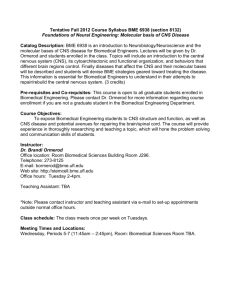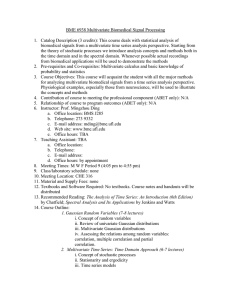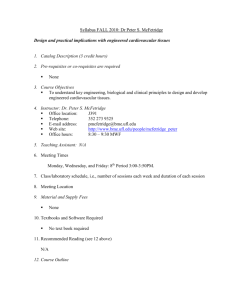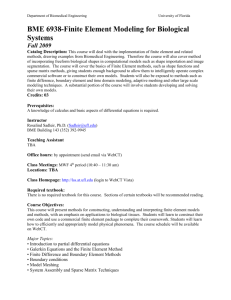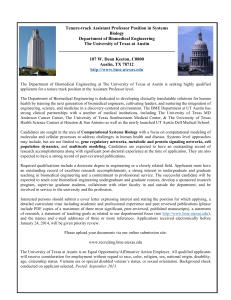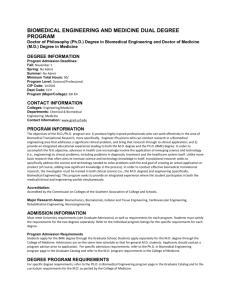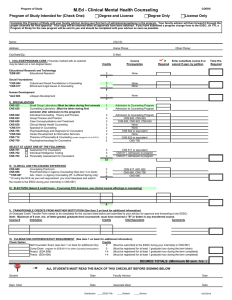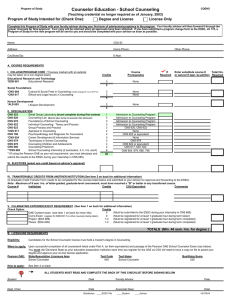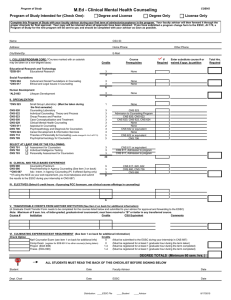Tentative Fall 2010 Syllabus - Biomedical Engineering
advertisement
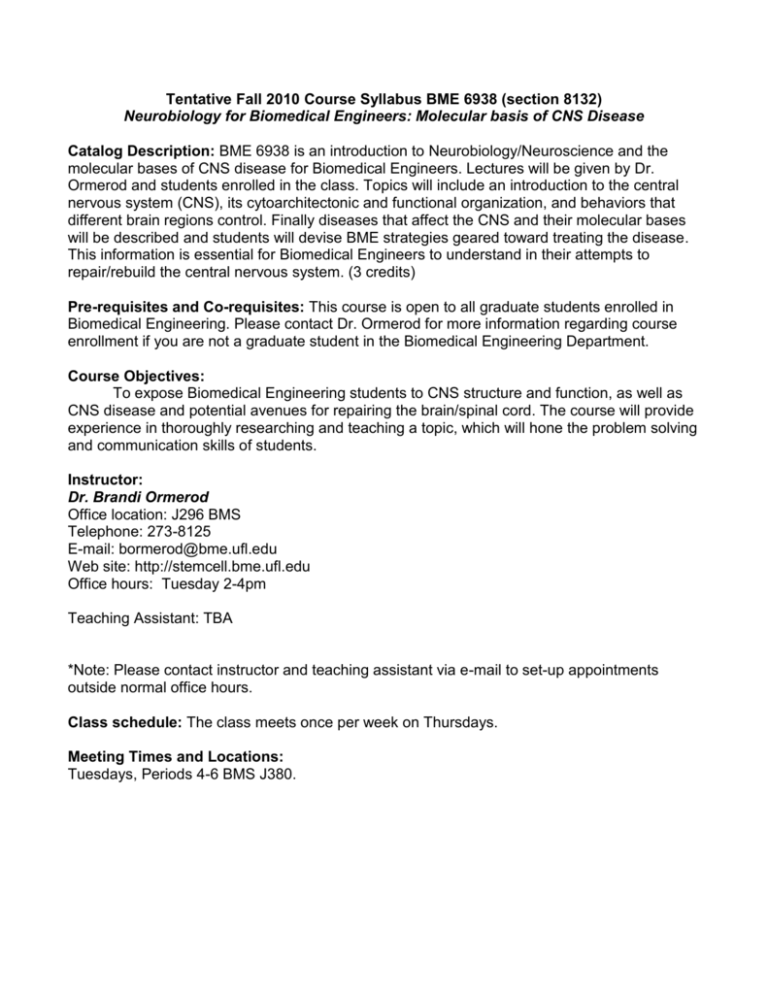
Tentative Fall 2010 Course Syllabus BME 6938 (section 8132) Neurobiology for Biomedical Engineers: Molecular basis of CNS Disease Catalog Description: BME 6938 is an introduction to Neurobiology/Neuroscience and the molecular bases of CNS disease for Biomedical Engineers. Lectures will be given by Dr. Ormerod and students enrolled in the class. Topics will include an introduction to the central nervous system (CNS), its cytoarchitectonic and functional organization, and behaviors that different brain regions control. Finally diseases that affect the CNS and their molecular bases will be described and students will devise BME strategies geared toward treating the disease. This information is essential for Biomedical Engineers to understand in their attempts to repair/rebuild the central nervous system. (3 credits) Pre-requisites and Co-requisites: This course is open to all graduate students enrolled in Biomedical Engineering. Please contact Dr. Ormerod for more information regarding course enrollment if you are not a graduate student in the Biomedical Engineering Department. Course Objectives: To expose Biomedical Engineering students to CNS structure and function, as well as CNS disease and potential avenues for repairing the brain/spinal cord. The course will provide experience in thoroughly researching and teaching a topic, which will hone the problem solving and communication skills of students. Instructor: Dr. Brandi Ormerod Office location: J296 BMS Telephone: 273-8125 E-mail: bormerod@bme.ufl.edu Web site: http://stemcell.bme.ufl.edu Office hours: Tuesday 2-4pm Teaching Assistant: TBA *Note: Please contact instructor and teaching assistant via e-mail to set-up appointments outside normal office hours. Class schedule: The class meets once per week on Thursdays. Meeting Times and Locations: Tuesdays, Periods 4-6 BMS J380. Required Textbooks: Principles of Neural Science, 4th Edition. 2000. Eric R. Kandel, James H. Schwartz and Thomas M. Jessell (Eds). ISBN 9780838577011. McGraw Hill. *This is the quinetessential textbook for anyone researching the CNS. Suggested Textbook: The Biochemical Basis of Neuropharmacology. 2003. Jack R. Cooper, Floyd E. Bloom and Robert H. Roth. ISBN 019514007. Oxford University Press. Outline TBA 1. Attendance and Expectations a) Respect for others i) No cell phone or laptop use during any classes (you will be asked to leave and will receive 0 for participation that day). ii) No off-topic discussion during class (you will be asked to leave and will receive 0 for participation that day). b) Professionalism i) Be on time to class ii) Be well prepared for classes (assigned readings should be completed BEFORE class). iii) Actively participate in classes, but stay on topic (off topic discussion will subtract points from your grade). iv) Be courteous and cooperative v) Uphold UF’s Honor Code c) Attendance is required as your grade will reflect your class participation. d) Students missing classes will not be able to make up grades for class participation. 2. Grading: a) Participation: 30% (you must read prior to class, attend class, and ask questions during class) b) Presentation 1: 25% - talk handouts should be provided before talk Bii) Annotated Bibliography (Complete version due 1 day after Talk 1) – 10% ci) Presentation 2: 25% - talk handouts should be provided before talk cii) Annotated Bibliography (Prelim due 1 week before talk; Final due 1 day after talk): 10% 3. Grading Scale: A A- B+ B B- C+ C C- D+ D D- E > 90 87-89 84-86 80-83 77-79 74-76 70-73 67-69 64-66 60-63 57-59 < 56 4. Make-up Exam Policy – not applicable. 5. Late Policy – DON’T hand things in late. This is graduate school. 6. Honesty Policy – All students admitted to the University of Florida have signed a statement of academic honesty. Doing so commits them to be honest in all academic work and failure to comply with this commitment will result in disciplinary action. Thus, this is a reminder to uphold your obligation as a UF student and to be honest in all work submitted and quizzes/exams taken in this course and all others. An honor code violation will receive a zero grades on the assignment or exam and will be referred to the honor court for prosecution. Note: Any information that has been copied to any degree from the internet or from published material is considered to be plagiarized. Any idea that is recycled (reworded) without being appropriately cited is also considered to be plagiarized. Plagiarism is a violation of the academic honesty policy. You are responsible for understanding what plagiarism is. If you plagiarize, you will receive ZERO for the assignment and will be reported to the department (no exceptions – this is graduate school). 7. Accommodation for Students with Disabilities – Students requesting classroom accommodation must first register with the Dean of Students Office. That office will provide the student with documentation that he/she must provide to the course instructor when requesting accommodation. 8. UF Counseling Services – Resources are available on-campus for students having personal problems or lacking clear career and academic goals. The resources include: a) University Counseling Center, 301 Peabody Hall, 392-1575, Personal and Career Counseling. b) SHCC mental Health, Student Health Care Center, 392-1171, Personal and Counseling. c) Center for Sexual Assault/Abuse Recovery and Education (CARE), Student Health Care Center, 392-1161, sexual assault counseling. d) Career Resource Center, Reitz Union, 392-1601, career development assistance and counseling.

